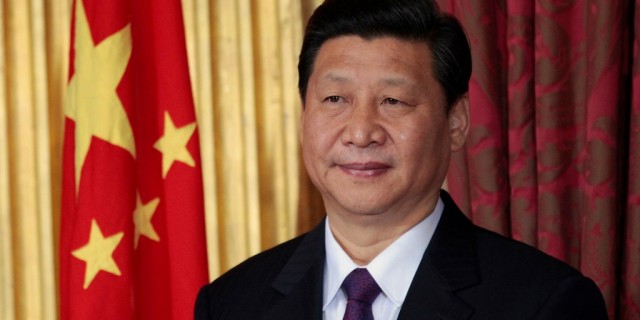
May 18, 2015, by Katharine Adeney
Xi Jinping’s Pakistan visit: what’s left behind?
By Filippo Boni.
The long-awaited visit has finally taken place. Xi Jinping’s first official visit abroad this year was to Islamabad, previously postponed due to the September 2014 dharna (sit-in) organised by Imran Khan’s PTI. “I feel as if I am going to visit the home of my brother” said Xi Jinping ahead of his trip to Pakistan in an editorial published in the Daily Times, a tradition that the Chinese President inaugurated last fall at the dawn of his South Asian tour to Sri Lanka, the Maldives and India.
The arrival saw a red carpet welcome at the airport, and a reminder of the Pakistan and China’s long-standing joint defence cooperation with four JF 17 Fighters accompanying Xi’s plane as it entered Pakistani airspace. While reiterating the intangible dimension of Pakistan-Chinas’ “all-weather” narrative, the more tangible, substantive part of his trip was yet to come.
During the two-day visit, 51 MoUs were signed between the two countries, as China’s leader himself reported, along with a Joint Statement on the establishment of the All-Weather Strategic Cooperative Partnership. In particular, 4 MoUs on concessional loans for the Karakoram Highway upgrade, for the Karachi-Lahore Motorway (Multan-Sukkur section), Gwadar International Airport and the Gwadar East-Way Express Bay were signed. The latter, according to official sources in the Planning Commission, is a project worth around $140 million USD and is one of the early harvest projects foreseen by the China-Pakistan joint working group.
Pakistan is hopeful of the prospects that the new tranche of Chinese investments will bring. Fieldwork interviews in Pakistan earlier this year repeatedly emphasised that the CPEC is going to bring a “transformational change” to the economy of Pakistan as the CPEC represents the Pakistani government’s effort to take an integrated, comprehensive and all-Pakistan approach.
After the hype and the recent sparking of praise and “all-weather” language it is important to bear in mind that the China-Pakistan Economic Corridor is a long-term project. As an official in the Planning Commission of Pakistan told me, the focus is now on the projects that will have a short term impact, including the Multan-Sukkur and Rialkot-Islamabad road links. Although some of these might already be at an advanced stage, the completion of the corridor is far from being achieved and it will take at least a decade. Second, security considerations were indeed one of the hot points on the table during the last meeting. As the Chinese Foreign Office spokesperson highlighted, “we also believe that bilateral cooperation in security and economic fields should advance in parallel and reinforce each other”. With reference to the CPEC, it was initially projected to pass through the provinces of Balochistan and Khyber Pakhtunkhwa (KPK), as this represented the shortest available route. However, the deteriorating security situation in both provinces led to a redefinition of the routes, with controversial results. The official version wants the change in the alignment due the choice of upgrading the existing road and rail links. While this may be hold true, it is undeniable that the security situation in KPK and Balochistan weighted heavily in the decision to initially go through Punjab.
Against this backdrop, the army is going to provide security to Chinese workers in Pakistan by creating a special security division, of around 10,000 troops, whose exclusive remit is going to be the protection of Chinese nationals involved in the CPEC projects. While this is an important message that Pakistan is sending to its Chinese “iron brother”, there are also some important implications for Pakistan’s domestic politics which must be considered. As the Express Tribune reported, the Ministry of Interior, Chaudhry Nisar Ali Khan, did not feature in the agenda of the Chinese President, which can be interpreted as a signal that the army is not willing to abdicate on one of his historical prerogatives, namely Pakistan’s security policy.
Beijing has so far demonstrated a consistent and resilient interest in Pakistan, in spite of the difficult circumstances that its firms and workers are facing. Premier Xi Jinping has invested a large extent of his presidency in the creation of the Silk Road Economic Belt and the 21st Century Maritime Silk Road. Gwadar, and the China-Pakistan Economic Corridor, are some of the linchpins in the new economic and strategic architecture foreseen by China’s initiatives. Pakistan cannot afford to lose this opportunity to benefit from and being integrated into Asia’s economic and trade growing interdependency. By attaching the highest priority to the completion of the abovementioned projects, the country needs to ensure that the flow of China’s investments will truly represent the “game changer” that the country’s economy waiting for. In this respect, the Prime Minister’s decision to establish a “delivery unit” which will oversee the implementation of the projects signed with the Chinese represents an important step in the right direction.
Filippo Boni is a doctoral researcher in the Institute of Asia and Pacific Studies in the School of Politics and International Relations at the University of Nottingham. He tweets @FilippoBoni1.
No comments yet, fill out a comment to be the first

Leave a Reply